When it comes to electric SUVs, the competition is fierce, with automakers pushing the limits of technology and innovation. In this article, we will compare two noteworthy contenders: the BMW iX1 and the Tesla Model Y. Both vehicles promise performance, luxury, and practicality, but how do they stack up against each other?
BMW iX1 vs Tesla Model Y - Differences and prices compared
Compare performance (313 HP vs 627 HP), boot space and price (42300 £ vs 34300 £ ) at a glance. Find out which car is the better choice for you – BMW iX1 or Tesla Model Y?
Design and Dimensions
The BMW iX1 presents a compact yet robust silhouette typical of the brand's design ethos. With a length of 4500 mm and a height of 1616 mm, it offers a sporty feel without compromising utility. The iX1 has a trunk capacity of 490 liters, providing ample storage for weekend getaways or grocery runs.
On the other hand, the Tesla Model Y measures 4751 mm in length and 1624 mm in height, making it slightly larger. It also boasts a more generous trunk capacity with options of 363 liters behind the second row and up to 854 liters with the seats down. This additional space may appeal to families or those needing that extra practicality.
Performance and Powertrains
Under the hood, the BMW iX1 offers two power variants: a 204 HP front-wheel-drive version and a powerful 313 HP all-wheel-drive model. It can accelerate from 0 to 100 km/h in just 5.6 seconds, showcasing its sporty ambitions. The iX1 demonstrates impressive efficiency, with a consumption rate of 15.8 kWh/100 km and an electric range of 463 km on the larger battery.
The Tesla Model Y, however, raises the stakes with a range of options generating up to 534 HP, making it more powerful than the iX1. The performance models can achieve a 0-100 km/h time of just 3.7 seconds. Even the standard versions have commendable efficiency figures, with consumption rates as low as 14.9 kWh/100 km and an impressive electric range reaching up to 600 km.
Driving Experience and Features
Both vehicles come equipped with advanced driving technologies. The BMW iX1 features an automatic transmission with a reduction gearbox, emphasizing smooth acceleration and driving comfort. It also has various driving modes to accommodate different preferences, from eco-friendly settings to sportier dynamics.
The Model Y’s automatic transmission is similarly equipped, but Tesla’s offerings frequently highlight their Autopilot hardware and advanced driving assistance features that are touted for their ability to make driving more effortless.
Battery Technologies and Charging
When it comes to battery capacity, the BMW iX1 relies on a 64.8 kWh battery, while the Tesla Model Y's battery options range from 62 kWh to 79 kWh, depending on the model. Tesla is renowned for its Supercharger network, allowing for rapid charging capabilities, while BMW is also developing its charging infrastructure to match the demand for electric vehicles.
Interior and Comfort
Inside the BMW iX1, high-quality materials and solid craftsmanship are evident. The dashboard features BMW's latest iDrive system, providing an intuitive user interface for infotainment and navigation. Five seats are standard, accommodating passengers comfortably without feeling cramped.
In contrast, the Tesla Model Y’s minimalist interior showcases a large touchscreen that controls nearly all the car’s functions, which some users may find more straightforward. With options for a third row of seating, Model Y can accommodate up to seven passengers, effectively catering to larger families.
Battery Sustainability and Environmental Impact
Both vehicles boast zero CO2 emissions, thanks to their all-electric powertrains. Additionally, BMW has been making strides in sustainability, with the iX1 being built using recyclable materials and focusing on a circular economy approach.
Tesla's commitment to sustainability is evident through its extensive use of renewable energy for production and its ongoing efforts to develop battery recycling technology, further minimizing the environmental impact of electric vehicles.
Conclusion: The Verdict
Choosing between the BMW iX1 and the Tesla Model Y ultimately boils down to individual preferences and priorities. The iX1 offers a robust build, luxurious interior, and sporty handling, making it an excellent choice for those who prioritize driving experience and brand quality.
On the other hand, the Tesla Model Y excels in performance, range, and practicality, making it a perfect fit for technology enthusiasts and families alike. Whichever you choose, both vehicles represent significant advancements in the electric SUV market.
Here’s where it gets real: The technical differences in detail
Costs and Efficiency:
Price and efficiency are often the first things buyers look at. Here it becomes clear which model has the long-term edge – whether at the pump, the plug, or in purchase price.
Tesla Model Y has a clearly perceptible advantage in terms of price – it starts at 34300 £ , while the BMW iX1 costs 42300 £ . That’s a price difference of around 8065 £.
In terms of energy consumption, the advantage goes to the Tesla Model Y: with 12.70 kWh per 100 km, it’s somewhat more efficient than the BMW iX1 with 14.30 kWh. That’s a difference of about 1.60 kWh.
As for electric range, the Tesla Model Y performs distinct better – achieving up to 657 km, about 143 km more than the BMW iX1.
Engine and Performance:
Under the bonnet, it becomes clear which model is tuned for sportiness and which one takes the lead when you hit the accelerator.
When it comes to engine power, the Tesla Model Y has a clearly edge – offering 627 HP compared to 313 HP. That’s roughly 314 HP more horsepower.
In acceleration from 0 to 100 km/h, the Tesla Model Y is clearly quicker – completing the sprint in 3.50 s, while the BMW iX1 takes 5.60 s. That’s about 2.10 s faster.
There’s also a difference in torque: BMW iX1 pulls hardly perceptible stronger with 494 Nm compared to 493 Nm. That’s about 1 Nm difference.
Space and Everyday Use:
Cabin size, boot volume and payload all play a role in everyday practicality. Here, comfort and flexibility make the difference.
Seats: Tesla Model Y offers noticeable more seating capacity – 7 vs 5.
In curb weight, BMW iX1 is minimal lighter – 1940 kg compared to 1953 kg. The difference is around 13 kg.
In terms of boot space, the Tesla Model Y offers decisively more room – 822 L compared to 490 L. That’s a difference of about 332 L.
When it comes to payload, BMW iX1 barely noticeable takes the win – 495 kg compared to 472 kg. That’s a difference of about 23 kg.
Who wins the race in the data check?
The Tesla Model Y is far ahead overall in the objective data comparison.
This result only shows which model scores more points on paper – not which of the two cars feels right for you.
Costs and Consumption
View detailed analysis
Engine and Performance
View detailed analysis
Dimensions and Body
View detailed analysis
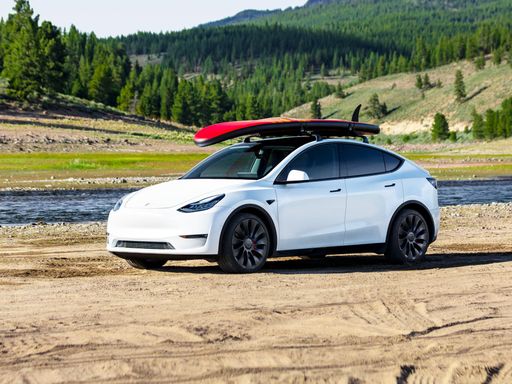
Tesla Model Y
BMW iX1
The BMW iX1 wraps BMW's electric ambition into a compact SUV package that feels unexpectedly premium, with sharp handling and a crisp, modern cabin that keeps the driver in charge. It's ideal for buyers who want a stylish, quiet daily driver with useful practicality and tech-savvy touches — plus enough character to make the commute feel less like a chore and more like a short joyride.
details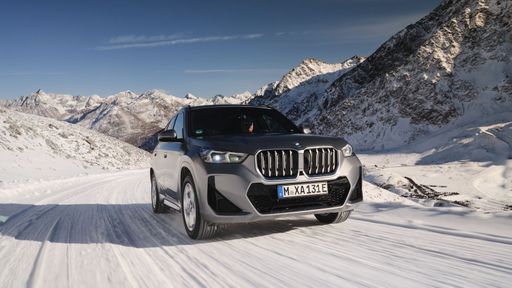
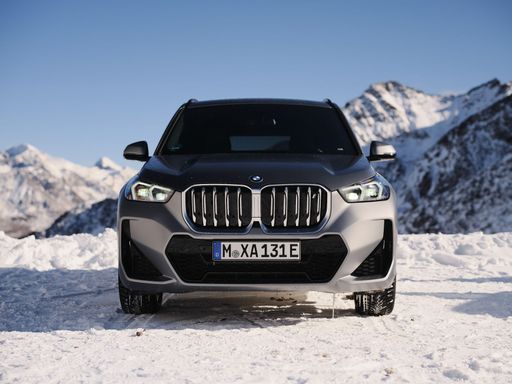
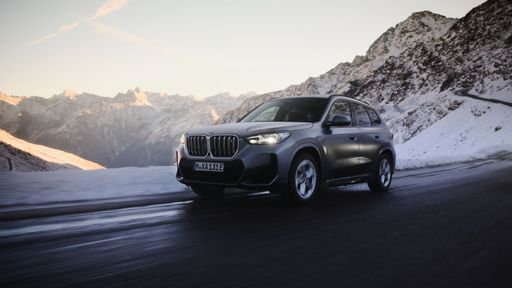
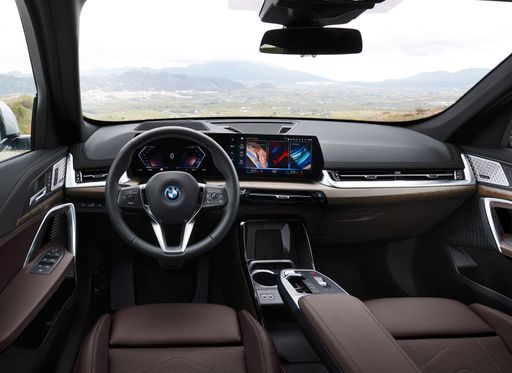
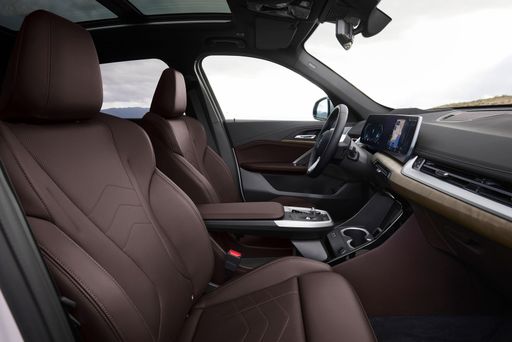
Tesla Model Y
The Tesla Model Y blends SUV practicality with sports-car poke, wrapping a roomy, minimalist cabin and handy hatch into a slick, aerodynamic package that feels more Silicon Valley gadget than garage ornament. It’s an ideal pick for buyers who want effortless electric driving, regular software improvements and access to Tesla’s convenient charging network, though style-conscious shoppers should know it’s more about tech and efficiency than classic luxury.
details
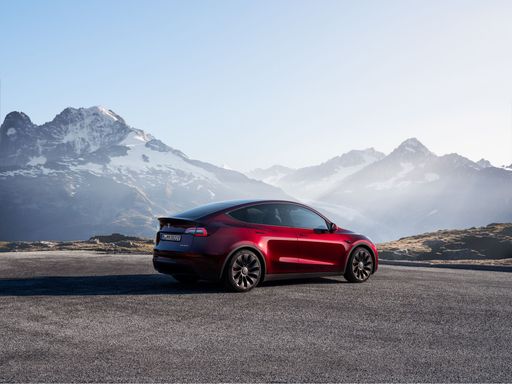
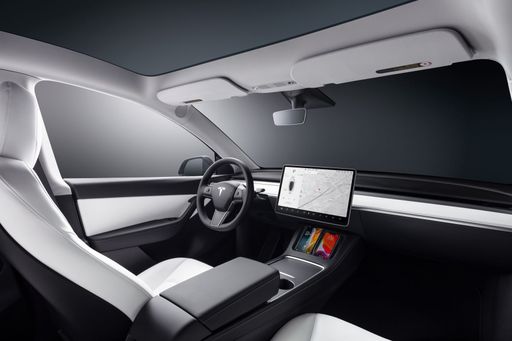
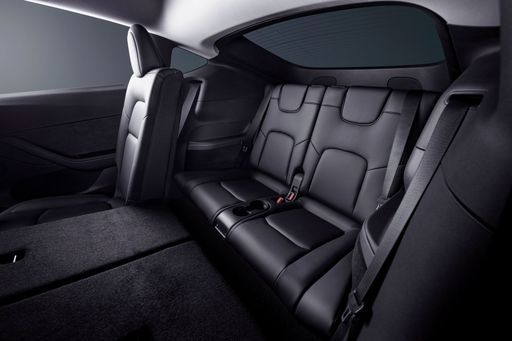
Costs and Consumption |
|
|---|---|
|
Price
42300 - 55200 £
|
Price
34300 - 53100 £
|
|
Consumption L/100km
-
|
Consumption L/100km
-
|
|
Consumption kWh/100km
14.3 - 15.7 kWh
|
Consumption kWh/100km
12.7 - 16.2 kWh
|
|
Electric Range
466 - 514 km
|
Electric Range
534 - 657 km
|
|
Battery Capacity
-
|
Battery Capacity
64.5 - 85 kWh
|
|
co2
0 g/km
|
co2
0 g/km
|
|
Fuel tank capacity
-
|
Fuel tank capacity
-
|
Dimensions and Body |
|
|---|---|
|
Body Type
SUV
|
Body Type
SUV
|
|
Seats
5
|
Seats
5 - 7
|
|
Doors
-
|
Doors
5
|
|
Curb weight
1940 - 2085 kg
|
Curb weight
1953 - 2108 kg
|
|
Trunk capacity
490 L
|
Trunk capacity
822 L
|
|
Length
-
|
Length
4790 - 4797 mm
|
|
Width
1845 mm
|
Width
1920 - 1921 mm
|
|
Height
-
|
Height
1611 - 1624 mm
|
|
Max trunk capacity
-
|
Max trunk capacity
2022 - 2138 L
|
|
Payload
495 kg
|
Payload
440 - 472 kg
|
Engine and Performance |
|
|---|---|
|
Engine Type
Electric
|
Engine Type
Electric
|
|
Transmission
Automatic
|
Transmission
Automatic
|
|
Transmission Detail
Reduction Gearbox
|
Transmission Detail
Reduction Gearbox
|
|
Drive Type
Front-Wheel Drive, All-Wheel Drive
|
Drive Type
All-Wheel Drive, Rear-Wheel Drive
|
|
Power HP
204 - 313 HP
|
Power HP
299 - 627 HP
|
|
Acceleration 0-100km/h
5.6 - 8.6 s
|
Acceleration 0-100km/h
3.5 - 7.2 s
|
|
Max Speed
-
|
Max Speed
201 - 250 km/h
|
|
Torque
250 - 494 Nm
|
Torque
420 - 493 Nm
|
|
Number of Cylinders
-
|
Number of Cylinders
-
|
|
Power kW
150 - 230 kW
|
Power kW
220 - 461 kW
|
|
Engine capacity
-
|
Engine capacity
-
|
General |
|
|---|---|
|
Model Year
2026
|
Model Year
2025 - 2026
|
|
CO2 Efficiency Class
A
|
CO2 Efficiency Class
A
|
|
Brand
BMW
|
Brand
Tesla
|
Is the BMW iX1 offered with different drivetrains?
The BMW iX1 is available as Front-Wheel Drive or All-Wheel Drive.
